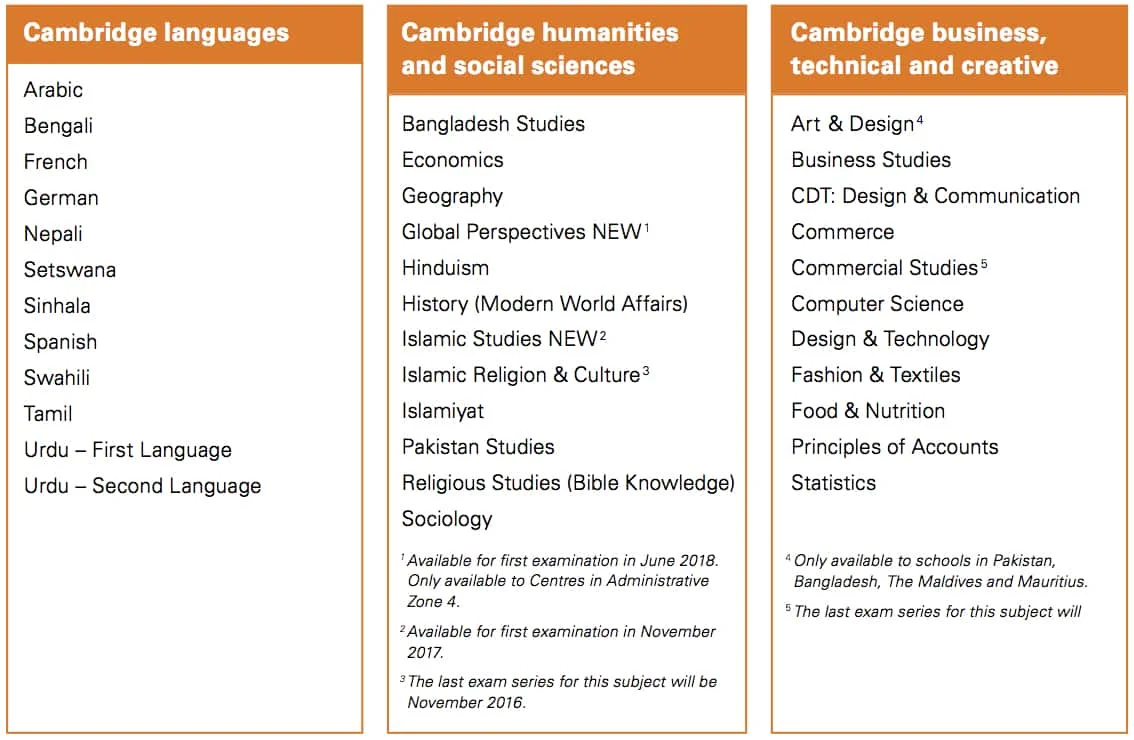
IGCSE English as a Second Language: Listening, Writing, and Speaking
Preparing for your IGCSE English as a Second Language (ESL) exam can feel daunting. You are not just learning grammar

Announcement: Cambridge IGCSE, O Level and AS & A Level June 2025 past papers are now available.
Announcement:
Cambridge International Education no longer be an Ofqual-recognised awarding organisation from December 20, 2024.
O-Level is the abbreviation of Ordinary Level. It is one of the two-part GCE (General Certificate of Education). The second part of GCE is Advanced Level (A-Level), which students enter after completing O-Level.
O-Level is the final certification for secondary school, to be taken at fifth form or year 11 at approximately age 17 (or age group 14-16). Students that have completed O-Level are considered to have completed formal education. They can further their studies to A-Level (at their schools’ sixth form or private colleges), Foundation Courses or diploma courses, or simply leaving school.
There are a few exam bodies offer O-Level, for example CAIE board, American Council for Higher Education and Edexcel International. Though schools in the UK had replaced O-Level with GCSE in 1988, it is still used in many Commonwealth countries, such as Bangladesh, Brunei, Malaysia, Malta, Mauritius, Pakistan, Singapore, Sri Lanka and also in Trinidad and Tobago. (Some schools in the UK have reverted back to exams based on O-Level at the later stage.)
O-levels are predominantly exam-based. Therefore, this is advantages for students in part-time or evening education. Some commentators criticised this mainly exam-based approach as offering only partial proof of the student’s overall ability in comparison with other methods (e.g., coursework-based assessment). There was no summative “school certificate”: each subject was a separate O-level in its own right.
(Below are the information for O Level from the CAIE exam board only.)
Cambridge O Level is an internationally recognised qualification equivalent to Cambridge IGCSE and the UK GCSE. It provides learners with excellent preparation for academic progression to Cambridge Advanced as well as other progression routes.
Cambridge O Levels has been designed especially for an international audience. They are sensitive to the needs of different countries and for learners whose first language may not be English. The curriculum also enables teaching to be placed in a localised context, making it relevant wherever you teach it.
In some parts of the world, schools use Cambridge O Level as an international alternative to the local national examination.
You can choose from more than 40 subjects in any combination to provide the building blocks to create your own curriculum. Students normally take 7-9 subjects in the O-Level exam, with maximum allowable 14 subjects.


Many schools allocate a total of about 130 hours for each Cambridge O Level subject, but how much time a school devotes to each subject will depend on a variety of factors. Though Cambridge sets the syllabus, but the school decides on the method of teaching. Candidates must enter for Cambridge O Levels through a registered school or exam centre. Your school or exam centre will be able to give you more details about how candidates work towards these assessments.
At school, more able candidates may study six or seven subjects at Cambridge O Level, but less able candidates may have a much more modest programme. In order to follow a broad and balanced curriculum, most candidates take courses from each of the five Cambridge O Level groups (Languages; Humanities and Social Sciences; Sciences; Mathematics; and Business, Creative, Technical and Vocational). However, it is also possible to study individual Cambridge O Level subjects if this better suits the candidate’s needs.
Cambridge O Level courses usually take two years to complete and exams are taken at the end of that period.
Assessment takes place at the end of the course and includes written, practical and oral assessment. This broadens opportunities for students to demonstrate their learning, particularly when their first language is not English.
Grades are benchmarked using six internationally recognised grades, from A* to E. Therefore, it has clear guidelines to explain the standard of achievement.
Grade A* is awarded for the highest level of achievement, and grade E indicates minimum satisfactory performance. Grade U (Ungraded) is commonly regarded as fail.
Cambridge O Level examination series occur twice a year, in June and November. Results release is in August and January.
Many universities worldwide require a combination of Cambridge International A Levels and Cambridge O Levels to meet their entry requirements. Leading US and Canadian universities require Cambridge International AS & A Levels, but some US and Canadian colleges and universities will accept learners with five Cambridge O Levels at grade C
or above.
In the UK, Cambridge O Level is accepted as equivalent to the GCSE. Many UK universities look at Cambridge O Level grades, as well as predicted grades for Cambridge International A Level, when making admissions decisions.
Universities in many countries, including Canada and the USA, will admit students on the basis of their Cambridge O-Level performances alone. Grade C in Cambridge O-Level English Language satisfies the English proficiency requirements of many universities in the UK and other English-speaking countries.
Although IGCSE and O Level are equivalent qualifications grade for grade, they are two different qualifications. IGCSE sets international standards, on the other hand, O Level syllabus meets specific local needs in each country. Other notable differences are the grading scale, assessment techniques, and coursework options.
| IGCSE | O Level | |
| Grading | Grades are awarded from A* (highest grade) to G (lowest) | Grades are awarded from A* to E |
| Assessment techniques | Tests oral and practical skills | Focuses on writing and reading skills in language subjects Restricted practical test options in sciences |
| Coursework options | Available in many syllabuses | Fewer coursework options |
Our valuable A* resources had produced thousands of A* scorers around the world. Check them out below.
Our internationally loved exam model answers had helped thousands of students in scoring A/A*. Schools and teachers worldwide have used these resources to aid in their teachings. Learn what an A* answer like, copy the style and score A* in your exam.
Our word-renowned IGCSE and AS/A Level courses had produced more than 1100 A/A* scorers worldwide. They are suitable for schooled or home-schooled candidates, and as full course or revision course.
We have the most complete past exam papers library on earth (no kidding!). Choose your exam board and download everything with one click.
Get the latest exam syllabus and plan your study accordingly.
Find out the exam registration and results released key dates for IGCSE and AS/A Level.
Check your administrative zone, the exam dates and time. For both IGCSE and AS/A Level.
Find and locate the nearest exam centre for your location.
Please kindly read the O Level FAQs here.
Note: CIE (Cambridge International Examination board) has its name changed to CAIE (Cambridge Assessment International Education) since October 2017.
In October 2023, CAIE updated its name, logo, look, and messaging. Cambridge International Education is the new name of the awarding body of Cambridge University Press & Assessment. This name will be used on materials related to administering exams and awarding qualifications.
Note: All relevant info taken from CIE.
Join 62,169 (and counting) IGCSE & AS/A Level subscribers who've taken our insanely valuable FREE email courses. Learn exam tips & score A* in your exam!
Join 62,169 (and counting) IGCSE & AS/A Level subscribers who’ve taken our insanely valuable FREE email courses. Learn exam tips & score A* in your exam!
Raaghav Goel
Raaghav Goel
Haneea Yasir
UAE
Haneea Yasir
UAE
Akila Ashraf
Akila Ashraf
Amir Ijaz
Saudi Arabia
Amir Ijaz
Saudi Arabia
Rios
Rios
Cedric Peridot
Cedric Peridot
Hanah
Sri Lanka
Hanah
Sri Lanka
Eva Muthusamy
Malaysia
Eva Muthusamy
Malaysia

Preparing for your IGCSE English as a Second Language (ESL) exam can feel daunting. You are not just learning grammar

Choosing the right educational pathway for your child is one of the most significant decisions a family can make. In

The IGCSE English First Language exam places a strong emphasis on creative writing, with writing descriptive and narrative essays being

In the IGCSE English First Language Directed Writing task, you’ll be required to either write a speech, letter, or article
572 responses
If I retake edexcel igcse accounting after completing advanced level accounting will I have to take advanced level accounting again because I retake igcse accounting
Hi Arnob,
As far as we know, you do not need to retake A Level if your A Level certificates are within the last 2 or 3 years when you apply for further studies. Some universities require A Level results to be within a certain timeframe of applying. Would you mind confirming with your chosen university about their requirements?
If you wish to improve your A Level grade then you are free to retake the exams.
We hope this helps. Thank you.
I have received grade e in accounting igcse edexcel but i have to register for advanced level accounting because grade e is acceptable for advanced level registration. However I need to retake igcse accounting again but after completing advanced level accounting for improving grades and for personal satisfaction so is it acceptable and will British council and Pearson will accept it . but will I have to take advanced level accounting again just because I will retake igcse accounting after completing advanced level accounting ?
Hi Arnob,
As far as we know, British Council can accept your retake entry for iGCSE Accounting even after completing Accounting at A Level.
Our advice is to retake it within 13 months, especially if you plan to gain university entrance. As some universities only accept certificates that are 13 months apart between the first and last exam.
We suggest you also check out with your preferred university if you need to retake A Level. Some universities require A Level results to be within a certain timeframe of applying. For example, your A Level certificates should be within the last 2 or 3 years.
We hope this helps. Thank you.
I did not taken maths igcse edexcel so can I register for edexcel accounting and business studies advanced level. Will British council and Pearson accept my advanced level registration .
Hi Arnob,
In general, there won’t be any problems with the exam registration if you did not take Maths at iGCSE level. But we have also learned from your past comments that you received a grade of E at iGCSE Accounting. We strongly suggest that you check with your exam centre if they have grade requirements for A Level.
Furthermore, we strongly suggest that you consider taking Maths. Maths is usually part of most universities’ entry requirements.
We hope this helps. Thank you.
I have failed in accounting igcse but I need to register for edexcel accounting a level after completing a level accounting I will retake igcse accounting . so will pearson edexcel and British council accept my advanced level accounting registration or its against the rules of Pearson and British council
Hi Arnob,
Pearson may have grade entry requirements for A Level. We suggest that you confirm this with your exam centre.
If you read the Accounting syllabus, it is stated under the Prior learning and other requirements that “Students who would benefit most from studying these qualifications are likely to have a Level 2 qualification such as an International GCSE in Accounting at grades 9 to 4 or A* to C.”
Thank you for your understanding.
What is combinig results in edexcel and I have taken 5 subjects including accounting and maths but I need to complete advanced level accounting and business studies first and then retake igcse accounting and maths I got e in accounting igcse and fail in maths so how will my results combine . is there any difficulty to combine my results for this situation
Hi Arnob,
Combining results means that when you sit for iGCSE in multiple exam series and use the certificates to gain university entrance. Some universities only accept certificates that are 13 months apart.
For example, if you first sat for IGCSE last June 2021, you need to retake Accounting and Maths on or before the June 2022 exam series. The certificates will be within 13 months between the first and last iGCSE exams.
We hope this helps. Thank you.